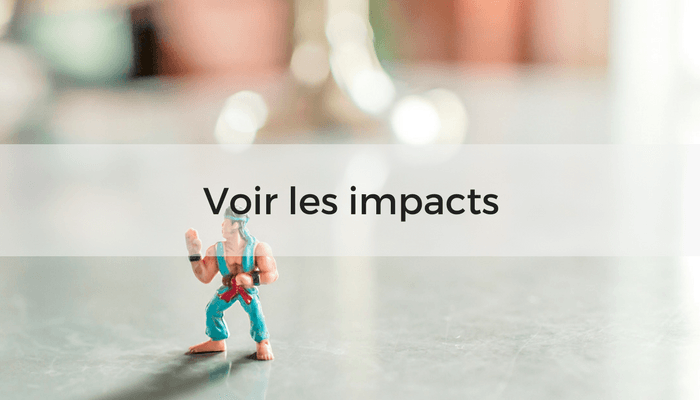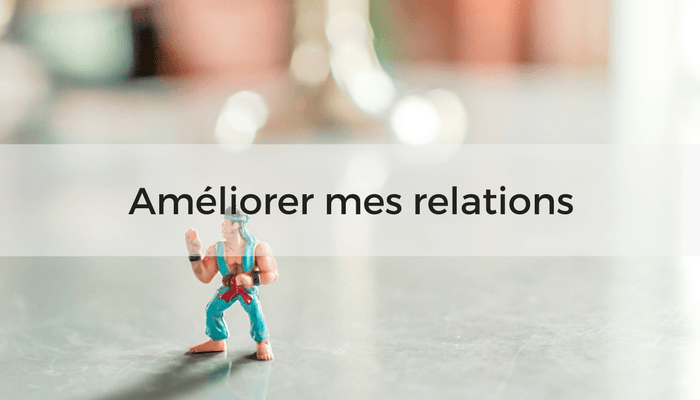I’m not talking about “healthy” conflicts, i.e. those that allow us to move forward, to question ourselves and eventually to improve relationships.
I’m talking about latent conflicts, conflicts that eat up energy, difficult relationships…
A colleague, your boss, a member of the extended family? What can you do to be able to have a healthy relationship without generating energy-consuming conflicts?
“I became very impatient when things didn’t go at my pace. I put pressure on myself, my non-verbal language became difficult to manage. I could see that the fact that I couldn’t establish a healthy relationship with certain people was causing me problems, but what could I do? »
Here are some tips on how to improve more difficult relationships, so that you don’t generate conflict.
Significant Option: View Impacts
Take a moment to do some introspection. Think about the people with whom it is more difficult to enter into a relationship without generating conflicts.
- What are the impacts on you?
- Stress, insomnia, frustration, difficult access to a promotion, etc.
- What are the impacts on them?
- Tension, complex management, etc.
- How would you like your relationships to be from now on?
- Simple, open, etc.
- Are you ready for it?
- Are you ready to have relationships as you described above? You have a share of responsibility for what happens. Are you ready to accept it and change your behavior?
In Action: Doing Differently
During a discussion or interaction where you feel that conflict could come up easily.
#1 Ask yourself these questions before answering or arguing:
- How does this person feel about the current confrontational discussion?
- What are their needs in relation to the situation?
- How can you meet their needs without sacrificing your own needs?
Often, just by asking these questions, the tension will decrease.
We are talking about empathy, i.e. the ability to see reality through the glasses of the other. When we feel that the other person is showing empathy, we immediately feel better. There’s nothing complex here. It’s a very simple concept: to return to a human-to-human mode. If you feel it, it’s about approaching everything in a simple and straightforward way. This is often very effective. That is my kind of approach, and I do not know if it is yours. Here is an example, it’s up to you to see if it looks like you! (replace the
<words>) I realize that I am in the process of
<Make a Whole Dish> because of <your delay>. What happens is that I feel <Frustrated> from <Suffer the impacts of your tardiness on my own schedule>. I wish <Find a solution to improve scheduling> management and I wish we could have a relationship <simple and open>. What do you say?
In the longer term: improving your relationship
To do, when you ruminate about a person with whom relations are more difficult…
#1: List three things you like about this person
To help you find them:
- What do you admire about this person?
- What are its qualities?
For example: she organizes meetings well, she is polite, she is diplomatic, she expresses herself clearly, she is generous, she is always well cared for, etc. Write them down. Keep in plain sight the elements you have noted. For example, in your notebook, on a visible post-it, on the fridge, in your car, on the wallpaper of your tablet, etc.
By regularly rereading your notes, observe yourself gradually changing your attitude towards this person!
For the bravest, the next step would be to invite this person for a coffee, or a lunch to tell them what you like about them. With this, your relationship will definitely change and be renewed!
#2: Understanding the other’s universe
Take a piece of paper and draw four quadrants.
- Work: his work, his responsibilities, his problems.
- Home: his family, his responsibilities, his problems.
- Past: difficulties, tragedies.
- Dreams: goals, dreams, ambitions.
Give yourself three minutes per quadrant to write down as much information as possible.
When you’re done, read it out loud with the intention of understanding the other person better.
Review your list if necessary.
By better understanding the other’s world, it is easier to be empathetic and forgiving.
Conclusion
In order not to generate conflicts, which I would describe as avoidable and energy-consuming, I have proposed three tips: by better understanding the impacts of our behaviors on ourselves and on others, by choosing our way of being and finally by developing tools for developing empathy. This way, you will be able to create more positive relationships. What will you put into practice? You may be interested in the 1h30 online training Managing a Team, where you can assess how you respond to conflict.






